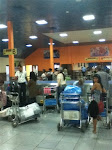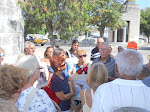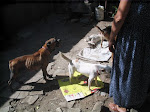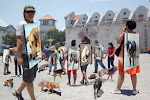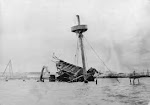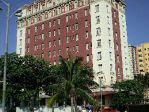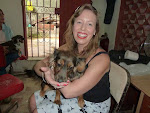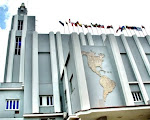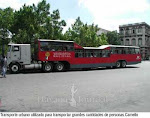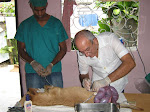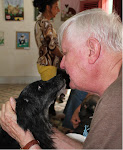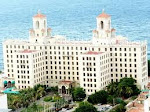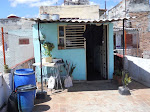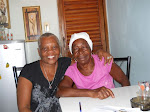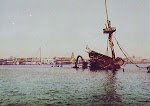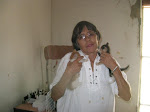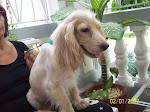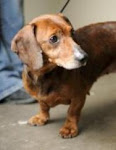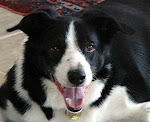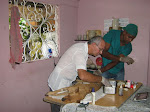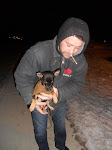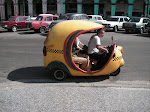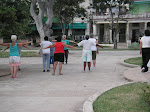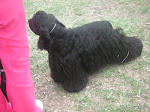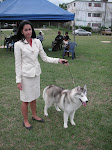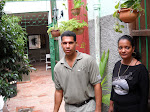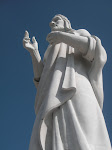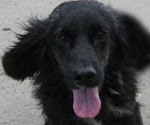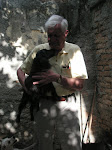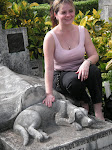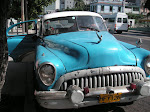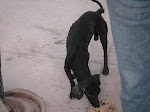Drop by Drop
In Spanish, "el cuentagotas" means medicine dropper. It is one of a weird collection of Spanish words with a plural feminine ending that is, indeed, masculine and singular. The word literally means count ("cuenta") drops (gotas"). We've all used these little droppers to dispense drops of medicine into eyes or ears or wherever.
I'm reminded of what's going on between Cuba and America as both governments take tiny, tentative, and measured steps toward a more normal relationship. Pride seems to prevent either side's launching an all-out peace initiative, but economic necessity presses both sides to relax its long time sanctions against the other. Neither country seems ready to wage peace, but both keep throwing little teasers out to see what will happen.
Consider these relaxations on the part of Cuba in recent years:
1. Cubans can now have and use cell phones.
2. Cubans can stay in tourist hotels now.
3. Cubans can now buy and sell their houses and cars.
And, not to be outdone, the US has made these changes:
1. Many Bush era restrictions on travel to Cuba have been dropped.
2. Educational and people to people tours have been restored
3. Many US airports are now allowed to offer direct, non-stop flights to Cuba.
Personally, I rejoice at each liberalizing change. At the present time we are planning a trip to Havana next March. When I called Alex, my travel agent in Miami, to get some information for the trip, I was worried when his office told me he was no longer with that firm. They were nice enough to tell me he had moved to Tampa and to give me his new phone number.
Why did Alex move? Well, Tampa is one of the new group of several cities authorized to have direct flights to Cuba. And,a s Alex is a smart businessman; he knows Tampa has a very large Cuban population--probably due to the old cigar industry in Tampa and to the large shipping trade between Tampa and Havana before the embargo.
It seems obvious that more traffic between Cuba and America means more jobs here, and maybe more there as well. Also, instead of being a mystery to Americans, Cuba will be better understood and perhaps both countries will treat each other better.
Not all people see these changes as good for America. Some stick by the policies of the last 50 years, insisting that any interchange between the two countries is appeasement to Cuba's leaders and should be avoided. With such a sharp division in beliefs regarding better relations, we should not expect rapid change from our ossified Congress of recent years.
But I'm celebrating that I'll be flying out of Tampa instead of Miami, and in the process, I'll avoid 300 miles of driving, renting a motel room for an additional night, and having to get up at 4:00 am to catch a flight.
Les Inglis
Friday, November 25, 2011
Saturday, November 19, 2011
Veterinary Politics
Veterinary Politics
Lots of things don't get done in Cuba because of the generally stressful state of the economy. This is certainly true of veterinary care for the people's dogs and cats. It isn't that Cuba doesn't have enough vets--they do. But the free vet education comes with a price; you have to work for the government. Thus after graduation, vets take jobs as meat inspectors, airport inspectors, teachers, public health officials, and the like. Domestic pets don't get much priority from the government, so there are precious few positions available in animal hospitals.
What makes vet care available for domestic pets is that vet salaries working for the government are very low--about $20 a month. So in a country of pet lovers, many vets turn to moonlighting. Many neighborhoods have a vet who has turned a garage or spare room into a vet office or surgery.
More than ten years ago Nora Garcia, Aniplant's President realized she could improve the availability of vet care for Havana's dogs and cats. She began establishing vet offices around the town and charging the clients whatever they could afford for the vet treatments. As a tribute to her energy and motivation, Aniplant soon operated ten branch vet office locations and was planning to open more. And Aniplant now had a source of income for its other programs.
Unfortunately some of the moonlighting vets with their own part time offices began to regard the chain of Aniplant vet offices as competition, a dirty word in a Communist country. The vets filed a complaint. A difference of this kind is settled between the different ministries involved after considering the position of the organizations within their oversight. All Cuban private organizations are overseen by one of the government ministries. In Aniplant's case, the overseer is the Ministry of Agriculture, and the veterinarians have a different ministry.
The way it worked out, Aniplant was obligated to close their vet offices, but they were allowed to operate one only. In 2005 when I first knew Aniplant, they were not even operating the one branch they were permitted, as their headquarters was hard to find and up eight flights of stairs.
Today, with Aniplant's new easy to find Central Havana street level headquarters, Aniplant is building a new vet office with special assistance from Dr. Richard White, a world traveling veterinarian from the UK. His generous support is helping the new clinic to come into being.
We keep finding new friends for the animals of Cuba.
Les Inglis
Lots of things don't get done in Cuba because of the generally stressful state of the economy. This is certainly true of veterinary care for the people's dogs and cats. It isn't that Cuba doesn't have enough vets--they do. But the free vet education comes with a price; you have to work for the government. Thus after graduation, vets take jobs as meat inspectors, airport inspectors, teachers, public health officials, and the like. Domestic pets don't get much priority from the government, so there are precious few positions available in animal hospitals.
What makes vet care available for domestic pets is that vet salaries working for the government are very low--about $20 a month. So in a country of pet lovers, many vets turn to moonlighting. Many neighborhoods have a vet who has turned a garage or spare room into a vet office or surgery.
More than ten years ago Nora Garcia, Aniplant's President realized she could improve the availability of vet care for Havana's dogs and cats. She began establishing vet offices around the town and charging the clients whatever they could afford for the vet treatments. As a tribute to her energy and motivation, Aniplant soon operated ten branch vet office locations and was planning to open more. And Aniplant now had a source of income for its other programs.
Unfortunately some of the moonlighting vets with their own part time offices began to regard the chain of Aniplant vet offices as competition, a dirty word in a Communist country. The vets filed a complaint. A difference of this kind is settled between the different ministries involved after considering the position of the organizations within their oversight. All Cuban private organizations are overseen by one of the government ministries. In Aniplant's case, the overseer is the Ministry of Agriculture, and the veterinarians have a different ministry.
The way it worked out, Aniplant was obligated to close their vet offices, but they were allowed to operate one only. In 2005 when I first knew Aniplant, they were not even operating the one branch they were permitted, as their headquarters was hard to find and up eight flights of stairs.
Today, with Aniplant's new easy to find Central Havana street level headquarters, Aniplant is building a new vet office with special assistance from Dr. Richard White, a world traveling veterinarian from the UK. His generous support is helping the new clinic to come into being.
We keep finding new friends for the animals of Cuba.
Les Inglis
Saturday, November 12, 2011
Cojimar
Cojimar
A few miles east of Havana lies the coastal fishing town of Cojimar, sitting on a lovely bay opening to the Florida Straits. It's a short drive from Ernest Hemingway's estate, Finca Vegia, which sits generally south of Havana. Connecting the finca and Cojimar are good roads and about 20 minutes are required to drive between the finca and the town.
For Hemingway, fishing seemed more important than living, and thus he bought his fishing boat, Pilar, a few years before he bought his Cuba home, the finca. Originally he rented dock space for the new boat at the Havana waterfront near his hotel, the Hotel Ambos Mundos, where he stayed and where he wrote some of his best known books. But soon he found a home for the boat in Cojimar. Thereafter, this little town was the base of his maritime operations.
He sometimes made the trip to Cojimar several times a week, and he soon found a favorite restaurant and bar in the little town. That restaurant, La Terraza is there today as is the rest of the town, seemingly unchanged from Hemingway's era. Like most tourist spots it is owned by the Cuban government, and it is kept in perfect condition.
The first thing you notice on entering La Terraza is the immaculate polished wooden floors. You enter directly into the bar room, and you see the back bar with nearly a hundred bottles of liquor, lined up precisely. A bar man awaits the requests of any tourists. Few locals drink or dine here as the prices (about what they would be here at home) are well beyond what fishermen can afford. But if the food and drink now are what they were like in Hemingway's time, it's no wonder this was one of his favorite haunts.
The Pilar had two first mates at different times. The first was Carlos Gutierrez, and the last was Gregorio Fuentes. Gutierrez might have been the inspiration for The Old Man and the Sea (although some academics think that Papa saw himself as the model for the old man). But Fuentes way outlasted Gutierrez, living right there until he was 104 years old in 2002 and picking up money from tourists by posing for photos.
Cojimar is a sleepy little place today, as it was way back when. If there is any action at all it's out beyond sight--beyond the reef--where the epic fights for huge fish are engaged. The locals bring in their catch, and some of it ends up in the hands of the head chef at La Terraza. Nora and I have had lunch there a couple of times, but, being vegetarians, we bypassed the fish on the menu. The chef is happy to fix anything you want, and for us the last time he made us a fine vegan dish of rice, vegetables and spices, which he declined to enumerate.
We sat at the table we'd used once before--in the corner, partly surrounded by windows on two sides looking out and down to the bay and off to the deep blue water of the Gulf Stream. Far below us a lone fisherman fired up his outboard and chugged out to sea. I watched him and thought how what I was watching could have been the same scene played out in the late 1930's when I was a toddler, when Papa was in his prime, and since when the town and its people remain unchanged.
Les Inglis
A few miles east of Havana lies the coastal fishing town of Cojimar, sitting on a lovely bay opening to the Florida Straits. It's a short drive from Ernest Hemingway's estate, Finca Vegia, which sits generally south of Havana. Connecting the finca and Cojimar are good roads and about 20 minutes are required to drive between the finca and the town.
For Hemingway, fishing seemed more important than living, and thus he bought his fishing boat, Pilar, a few years before he bought his Cuba home, the finca. Originally he rented dock space for the new boat at the Havana waterfront near his hotel, the Hotel Ambos Mundos, where he stayed and where he wrote some of his best known books. But soon he found a home for the boat in Cojimar. Thereafter, this little town was the base of his maritime operations.
He sometimes made the trip to Cojimar several times a week, and he soon found a favorite restaurant and bar in the little town. That restaurant, La Terraza is there today as is the rest of the town, seemingly unchanged from Hemingway's era. Like most tourist spots it is owned by the Cuban government, and it is kept in perfect condition.
The first thing you notice on entering La Terraza is the immaculate polished wooden floors. You enter directly into the bar room, and you see the back bar with nearly a hundred bottles of liquor, lined up precisely. A bar man awaits the requests of any tourists. Few locals drink or dine here as the prices (about what they would be here at home) are well beyond what fishermen can afford. But if the food and drink now are what they were like in Hemingway's time, it's no wonder this was one of his favorite haunts.
The Pilar had two first mates at different times. The first was Carlos Gutierrez, and the last was Gregorio Fuentes. Gutierrez might have been the inspiration for The Old Man and the Sea (although some academics think that Papa saw himself as the model for the old man). But Fuentes way outlasted Gutierrez, living right there until he was 104 years old in 2002 and picking up money from tourists by posing for photos.
Cojimar is a sleepy little place today, as it was way back when. If there is any action at all it's out beyond sight--beyond the reef--where the epic fights for huge fish are engaged. The locals bring in their catch, and some of it ends up in the hands of the head chef at La Terraza. Nora and I have had lunch there a couple of times, but, being vegetarians, we bypassed the fish on the menu. The chef is happy to fix anything you want, and for us the last time he made us a fine vegan dish of rice, vegetables and spices, which he declined to enumerate.
We sat at the table we'd used once before--in the corner, partly surrounded by windows on two sides looking out and down to the bay and off to the deep blue water of the Gulf Stream. Far below us a lone fisherman fired up his outboard and chugged out to sea. I watched him and thought how what I was watching could have been the same scene played out in the late 1930's when I was a toddler, when Papa was in his prime, and since when the town and its people remain unchanged.
Les Inglis
Saturday, November 5, 2011
A Step in the RIght Direction
A Step in the Right Direction
I know these blogs are supposed to be about animals (mostly dogs and cats) in Cuba, but the quality of those animal lives is closely tied to that of their people. And Cuban people have many crosses to bear. So when a major change in the fortunes of the Cuban people takes place, it's good news for the animals as well. Such a change took place this week when the Cuban government allowed its citizens to buy and sell real estate.
Previously you couldn't buy or sell your home; you only had the right to trade properties with other Cubans. In a difficult maneuver with a lawyer officiating, you could swap homes with another Cuban. We became involved in this "permutta" system when a number of years ago Nora, Aniplant's president, found someone in central Havana who wanted to trade places with Aniplant's old headquarters. Finding such a willing fellow swapper wasn't easy as the old Aniplant headquarters was on the 8th floor of a building with a dead elevator hopelessly beyond repair. The other guy's place (to be Aniplant's new headquarters) was on the street level of a well-known street, and it served as that man's family home.
We found out about the arranged swap in 2006 when Nora told us of it and told us the average wait to formalize a swap was 4 years. She had already waited two years. "Can't it be expedited?" we asked. "Yes for a bribe of $150," we were told.
Think of it; a lack of $150 caused a four year wait for two parties who both wanted the swap. Someone in our group reached into his pocket, dug out $150, and gave it to Nora to get the project moving. Two days later, the lawyer moved Nora's file to the top of the pile, and the swap was done.
It wasn't all roses, however. The "new" headquarters is a 200 year old one story building needing roof work, a new roof top water tank, and every light switch, ceiling fixture, and wall plug had been removed and left with the old owner. Much additional time and donated money was needed to make the new headquarters into the showplace it is today.
But this week all those machinations became history as people gained the right to buy and sell their residences without prior government approval. Already some are predicting a new wave of prosperity as people take pride in their possessions and fix them up. Others predict an exodus as people with some cash from selling their homes leave for other countries. No one knows for sure what will happen, but it's a pretty good bet people will be better off.
What's good for the Cuban citizen is usually also good for his dog or cat. If nothing else, it will be a little easier to feed that animal if his master has more money in his pocket. And a rising tide floats all boats. More money in a man's hands means more work, more pay, better homes, etc. etc.
The first time I saw Havana, I was struck by the blotchy walls on large buildings made so by decades of no paint. I imagined a huge tanker floating into the harbor filled with white paint. It was a day dream, of course, but this city with many gorgeous buildings, some dating back to the 1700's could, in my mind's eye, be one of the most beautiful in the world. Paint and maintenance seemed all that stood between dishevelment and splendor.
Maybe now our Cuban neighbors (and their companion animals) will find a way toward a greater society with a higher standard of living.
When you work on the problems of animals, you dare not be a pessimist.
Les Inglis
I know these blogs are supposed to be about animals (mostly dogs and cats) in Cuba, but the quality of those animal lives is closely tied to that of their people. And Cuban people have many crosses to bear. So when a major change in the fortunes of the Cuban people takes place, it's good news for the animals as well. Such a change took place this week when the Cuban government allowed its citizens to buy and sell real estate.
Previously you couldn't buy or sell your home; you only had the right to trade properties with other Cubans. In a difficult maneuver with a lawyer officiating, you could swap homes with another Cuban. We became involved in this "permutta" system when a number of years ago Nora, Aniplant's president, found someone in central Havana who wanted to trade places with Aniplant's old headquarters. Finding such a willing fellow swapper wasn't easy as the old Aniplant headquarters was on the 8th floor of a building with a dead elevator hopelessly beyond repair. The other guy's place (to be Aniplant's new headquarters) was on the street level of a well-known street, and it served as that man's family home.
We found out about the arranged swap in 2006 when Nora told us of it and told us the average wait to formalize a swap was 4 years. She had already waited two years. "Can't it be expedited?" we asked. "Yes for a bribe of $150," we were told.
Think of it; a lack of $150 caused a four year wait for two parties who both wanted the swap. Someone in our group reached into his pocket, dug out $150, and gave it to Nora to get the project moving. Two days later, the lawyer moved Nora's file to the top of the pile, and the swap was done.
It wasn't all roses, however. The "new" headquarters is a 200 year old one story building needing roof work, a new roof top water tank, and every light switch, ceiling fixture, and wall plug had been removed and left with the old owner. Much additional time and donated money was needed to make the new headquarters into the showplace it is today.
But this week all those machinations became history as people gained the right to buy and sell their residences without prior government approval. Already some are predicting a new wave of prosperity as people take pride in their possessions and fix them up. Others predict an exodus as people with some cash from selling their homes leave for other countries. No one knows for sure what will happen, but it's a pretty good bet people will be better off.
What's good for the Cuban citizen is usually also good for his dog or cat. If nothing else, it will be a little easier to feed that animal if his master has more money in his pocket. And a rising tide floats all boats. More money in a man's hands means more work, more pay, better homes, etc. etc.
The first time I saw Havana, I was struck by the blotchy walls on large buildings made so by decades of no paint. I imagined a huge tanker floating into the harbor filled with white paint. It was a day dream, of course, but this city with many gorgeous buildings, some dating back to the 1700's could, in my mind's eye, be one of the most beautiful in the world. Paint and maintenance seemed all that stood between dishevelment and splendor.
Maybe now our Cuban neighbors (and their companion animals) will find a way toward a greater society with a higher standard of living.
When you work on the problems of animals, you dare not be a pessimist.
Les Inglis
Subscribe to:
Posts (Atom)
